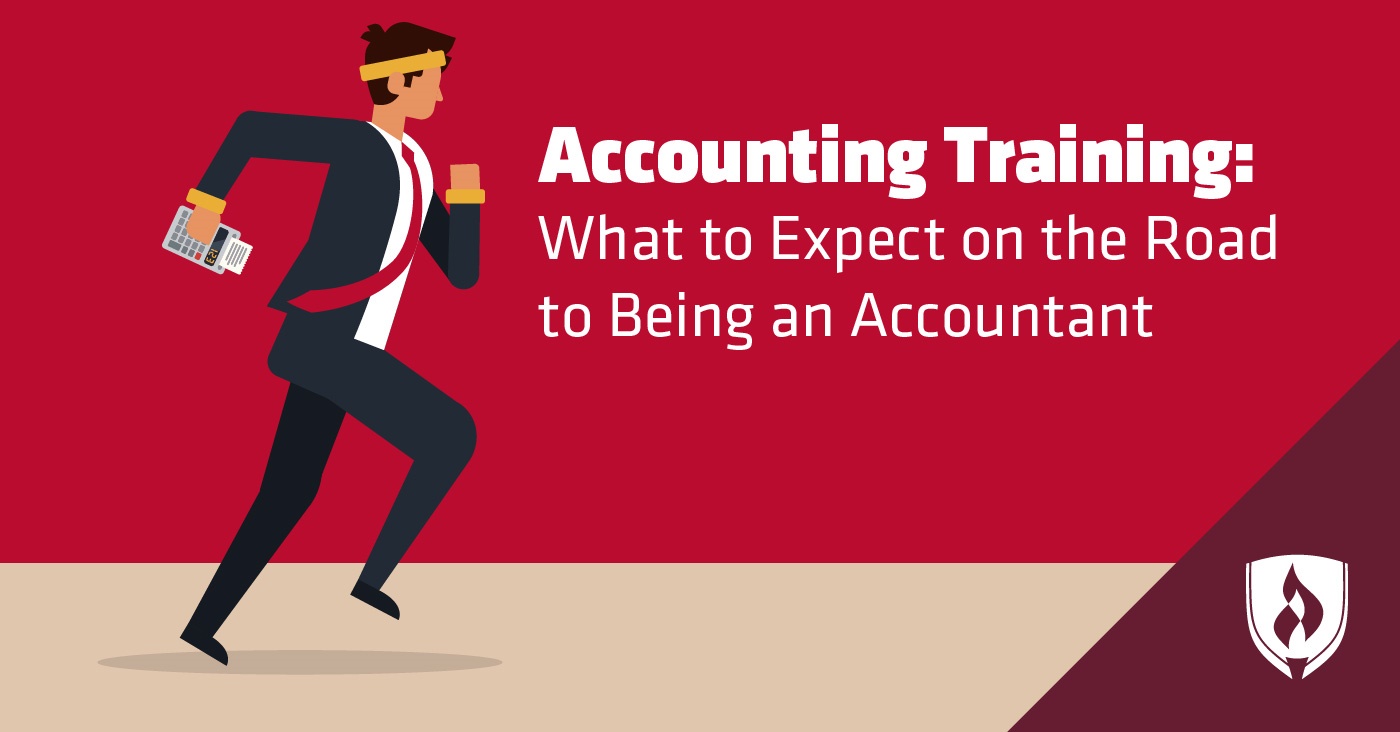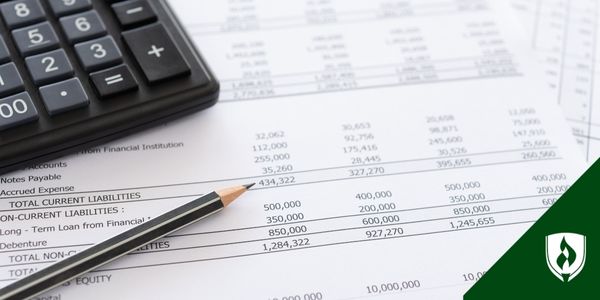Accounting Training: What to Expect on the Road to Being an Accountant
By Hannah Meinke on 05/04/2020

Wherever money is exchanged, somewhere down the line there are accountants to keep track of it. From small businesses to Fortune 500 companies, they keep a pulse on financial health and are crucial in every industry. If you're analytical and detail-oriented, you've probably considered a career in the field yourself. There are a lot of perks to a profession that deals in the language of business.
Yet, even if you’ve researched the role of an accountant, the road to becoming one requires its own investigation—which is why we’ve asked Rasmussen College Assistant Professor Roxanne Visser to shed some additional light on what you can expect. For all the details on what it takes to make it in this industry, keep reading. Explore Should I Become an Accountant? to delve deeper into whether this career path is right for you.
3 Things to consider for your accounting training
Whether you’re headed for the top or simply looking to bolster your accounting acumen, you’ll need to think about the following information.
1. Choosing the right accounting degree and program
The first step toward a career in accounting is finding the right education path for you. Like with many professions, there is both an Associate’s and Bachelor’s degree option. The one you choose will depend on what roles you want to pursue.
“Our Associate's degree prepares students for entry-level positions and specialized certifications for payroll, bookkeeping and income tax work,” Visser says. “Our Bachelor’s degree prepares students for movement up the management ladder into positions that require more presentation and analysis.”
In other words, if you want to be prepared to handle the full array of accounting-related responsibilities, the Bachelor’s degree route is right for you. For lower-level accounting and payroll duties an Associate’s degree or Accounting Certificate will fit the bill.
Perhaps more important than the degree, however, is what’s in the program. To help you prepare to be a competitive professional, Visser lays out the components that lead to a quality education.
An advisory board that meets frequently to keep courses updated with industry standards is key. This can ensure you are equipped with the most current practices—including modern computing software. Given that accounting can be very technology-heavy, these kinds of details can give your career the head start it needs.
Visser also recommends looking for a program with faculty that have practical experience in accounting. Having subject matter experts to develop and teach courses is another layer of assurance that you are receiving relevant instruction. This can make your transition from education to career much smoother.
2. Developing your skills through accounting courses
Once you’ve landed on a degree and a program, you’ll want to know about courses. This is where the bulk of your training will take place. Let’s take a closer look at some of the Accounting courses you’ll encounter at Rasmussen College:
- Financial Accounting I and II. Learn about the accounting cycle, and the process of journalizing, posting and creating financial statements.
- Computer Focused Principles. Apply foundations learned in Financial Accounting I and II to computerized accounting processes with tools like QuickBooks Online®.
- Advanced Auditing Concepts and Standards. Study professional ethics in accounting, analytical thinking, the evolution of business risk and internal control practices.
- Accounting Information Systems. Master practical applications using spreadsheets, databases and general ledger software.
- Corporate and International Accounting. Build on intermediate financial reporting concepts and explore advanced procedures related to interim and segment reporting, leases and taxes.
It’s no secret that there are some complex concepts to master in accounting—but that’s also part of why this is well-regarded profession. While everyone will progress differently, some areas may be more difficult than others.
“It can be a challenge to analyze financial statements for the first time,” admits Visser. It’s not just about calculation. It’s about evaluating a large amount of data to glean important insight about how a business functions. You’ve got to know precisely what you’re looking for.
“For this reason, you will find that students are asked to complete financial statement analysis throughout multiple courses in Rasmussen’s program,” says Visser.
Though it may take a while, this challenge can also become one of the most engaging things about your accounting training. Once you understand how to put all the pieces together, the process of investigating numbers can elevate the role of an accountant beyond what you thought it was.
In addition to technical ability, Visser says that any good accounting program will also teach you the transferable skills you need to be a successful professional. She lists some of the key areas that are important to focus on:
- Communication
- Critical thinking
- Ethics and professional responsibility
- Information literacy
- Digital fluency
- Diversity, equity and inclusion
also, check out qualities of an accountant you might already have.
3. Prepping for accounting certification
Once you obtain your education, there are a few non-academic accounting certifications or credentials you may want to consider depending on your career goals. While an Accounting degree can help prepare you for a variety of roles, these credentials may be appealing options to add to your resume.
Certified Public Accountant (CPA)
This is the most widely recognized and broadly applicable accounting credential. As a CPA, you would have the option to practice public accounting. This includes giving your opinion on publicly-traded company financials, writing audit reports, signing tax returns as a paid preparer, and representing clients in front of the IRS.
The requirements to sit for this exam vary by state, but you will need a bachelor’s degree to get started. There are 4 exams, which typically take around a year to study for and complete. This process can come with a substantial cost when including review materials and application fees. If that sounds like a big investment, keep in mind that employers may be willing to pay for some if not all of your exam expenses.
Certified Management Accountant (CMA)
This credential caters to financial professionals looking to take on executive-level duties such as analyzing budgets for internal review and advising companies as they make strategic business decisions. Certified Management Accountants have to demonstrate their financial planning, performance analysis and strategic financial management skills by passing two exams (totaling 8 hours). Applicants must have a bachelor’s degree to take the exam, typically focused in subjects like Accounting and Finance.
To learn more about CMAs, check out our article, “CMA Accounting: What Is It and How Do You Become One?”
Enrolled Agent (EA)
Looking to narrow your focus to issues of taxation? Becoming an Enrolled Agent may be an appealing option. These professionals are the only federally licensed tax practitioners who both specialize in taxation and have unlimited rights to represent taxpayers before the IRS. They advocate for people who are dealing with tax audits, collections and appeals.
There are no strict educational requirements for the EA exam, but this doesn’t mean that becoming an EA is easy. To earn this certification, you must take 3 exams, totaling 12 hours and cover any exam-related fees or expenses.
A road worth pursuing
If accounting training were easy, more people would do it. But by not taking the path of least resistance, you can set yourself up for a long and successful career in accounting. It’ll take some long hours and a lot of effort—but the prestige and stability of an accounting career can make it all worth it. Check out our other article, "10 Accounting Pros and Cons to Consider—Before You Make it Your Major".
Now that you know what to expect from the road ahead, you have the information you need to move forward. The next step is to investigate your education options. Start with the Rasmussen College Accounting programs page to begin weighing your options.
Each state determines its own requirements for licensure as a Certified Public Accountant (CPA). In addition to other requirements, most states require a bachelor’s degree and no fewer than 225 quarter credits (150 semester credits) of college coursework, specific in-field experience, and passage of the CPA licensing exam. Some states allow individuals to sit for the CPA licensing exam before obtaining all required college credits. The Accounting Bachelor’s Degree at Rasmussen College meets the educational requirements to sit for the CPA licensing exam in the following states: AK, AR, AZ, DE, GA, HI, IA, ID, KY, ME, MN, NH, NM, PA and TN. Additional examination eligibility and licensure requirements exist. Please consult with your state’s board of accountancy or equivalent oversight agency for further details, as requirements may change at any time. This program has not been approved by any state board of accountancy or other professional licensing agency.




